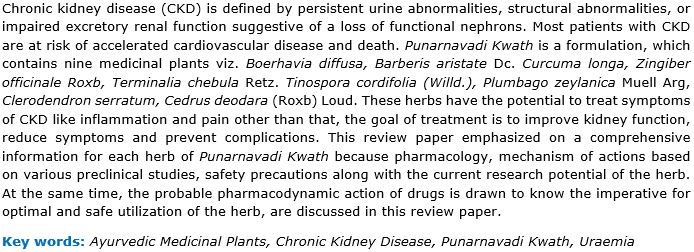A review on Punarnavadi Kwath : An Ayurvedic polyherbal formulation for Chronic Kidney Disease (CKD)
DOI:
https://doi.org/10.21760/jaims.8.7.10Keywords:
Ayurvedic Medicinal Plants, Chronic Kidney Disease, Punarnavadi Kwath, UraemiaAbstract
Chronic kidney disease (CKD) is defined by persistent urine abnormalities, structural abnormalities, or impaired excretory renal function suggestive of a loss of functional nephrons. Most patients with CKD are at risk of accelerated cardiovascular disease and death. Punarnavadi Kwath is a formulation, which contains nine medicinal plants viz. Boerhavia diffusa, Barberis aristate Dc. Curcuma longa, Zingiber officinale Roxb, Terminalia chebula Retz. Tinospora cordifolia (Willd.), Plumbago zeylanica Muell Arg, Clerodendron serratum, Cedrus deodara (Roxb) Loud. These herbs have the potential to treat symptoms of CKD like inflammation and pain other than that, the goal of treatment is to improve kidney function, reduce symptoms and prevent complications. This review paper emphasized on a comprehensive information for each herb of Punarnavadi Kwath because pharmacology, mechanism of actions based on various preclinical studies, safety precautions along with the current research potential of the herb. At the same time, the probable pharmacodynamic action of drugs is drawn to know the imperative for optimal and safe utilization of the herb, are discussed in this review paper.
Downloads
References
Punarnava information, medical use and more. Assess on www.biodiversityofindia.com (assessed on 25/07/2017).
Agnivesa’s Caraka Samhita Text with English translation& critical exposition based on Chakrapani Datta’s Ayurveda Dipika. Volume II. Published by Choukhamba Sanskrit Series Office. Varanasi. Edition -Reprint nidana Sthan.Chapter 4.Slok no 8. 2010. 56.
Sharandhar Samhita Dwitya Khand Dwitya Addhyay Soth Roga Page 247
Kaviraj Atrideva Gupt. Astanghridaya. Varanasi, Chaukhambha Sanskrit sansthan 2008 (uttartantra, rasayanaadhya, slok no-56,57), P-1233.
Anathram sharma. Sushrut samhita vol II.Varanasi, Chaukhambha Sanskrit sansthan 2012 (nidansthan-23thchapter slok no-68). P-485.
Vidhyadhar Shukla. Charak Samhita Uttarsthan. Varanasi. Chaukhambha Sanskrit sansthan 2012 (sidhisthan, 3rd chapter,slok no-68).P-989.
D.M.Padvi, Amarsingh Rathod and Santosh Chauhan. As ingle drug treatment for chronic Kidney Disease-A Case Study. IJAAYUSH, Volume 3, issue 1.pp-213-218.14 October2014
Punarnava information, medical use and more.assess on 25/07/2017. www.bimbima.com/herbs/punarnava /2950
Dr.Sumit Sriwastav.Ayurvedic managementof chronic renal failure-A case study.wjpps.vol4.issue 08.2015.923-928.
Ritu Yadav, JP Singh, Pankaj Sharma, Vikas Nariyad. Chronic kidney disease. A case study in Ayurvedic setting.IAMJ.Volume 5.issue 1.january 2017.
Gupta Maheshchand, Trilok chand. A critical review on commonly used herbal drug in CKD.Journal of medicinal plant studies 2015.3(4).44-45.
National Kidney Foundation. K/DOQI clinical practice guidelines for chronic Kidney disease: Evaluation, classification, and stratification. Am J Kidney Dis. 2002;39:S1–266. [PubMed] [Google Scholar]
Shah H. Incidence of Micro-Albuminuria in tobacco chewers. Indian J Clin Biochem. 2005;20:189–91. [PMC free article] [PubMed] [Google Scholar]
National Kidney Foundation. K/DOQI clinical practice guidelines for chronic Kidney disease: Evaluation, classification, and stratification. Am J Kidney Dis 2002;39:S1-266
Hebert LA, Wilmer WA, Falkenhain ME, Ladson-Wofford SE, Nahman NS Jr, Rovin BH. Renoprotection: One or many therapies? Kidney Int 2001;59:1211-26
Gupta LC, Chauhan RD, Gupta A. Interpretation of Common Investigations. In: Gupta LC, ed. 5th ed. New Delhi: Jaypee Publications 2006. p. 35.















